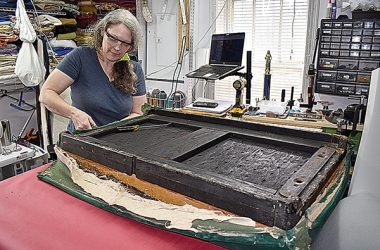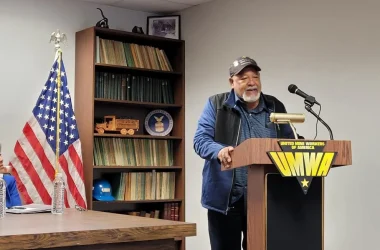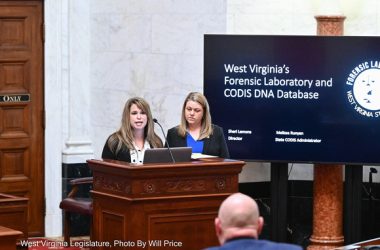By BRETT DUNLAP
The Parkersburg News and Sentinel
CHARLESTON, W.Va. — As the West Virginia Legislature worked to pass a budget bill early Sunday morning, local lawmakers have doubts the governor will end up signing that bill into law.

The Senate passed a version of the $4.1 billion budget in a 22-12 vote at 11:47 p.m. Saturday and the House ended up passing it in a 63-37 vote just before 1 a.m. Sunday after Gov. Jim Justice extended the session an extra day so lawmakers could finalize the budget.
Although Justice thought he had a deal worked out with the Senate leadership on the budget, the Senate and House passed a budget with steeper cuts and no tax increases.
Sen. Donna Boley, R-Pleasants, Sunday said the deal originally worked out between Senate President Mitch Carmichael, R-Jackson, and the governor dealt with a number of proposed tax reform issues, including lowering the income tax. However, the Senate did not have the time to finalize those measures.
“We didn’t have time to get it together,” Boley said.
The tax reform issues died in the Senate and they ended up passing a $4.1 billion budget that included no tax increases.
“It allows us to stay within our means,” Boley said. “This was the best we could get.”
House Speaker Tim Armstead, R-Kanawha, is urging the governor to sign the budget that was passed.
“(Saturday night/early Sunday morning), the House not only fulfilled its constitutional duty to pass a balanced budget, but fulfilled our promise to do so by controlling government spending, living within our means and protecting our citizens from tax increases,” Armstead said in a press release. “We have done our job and presented the governor with a spending plan that avoids drastic cuts to essential services and education, while also avoiding significant tax increases. It’s now time for the governor to live up to the campaign promise he made the West Virginia people and sign this budget that does not raise their taxes.”
Armstead said although the governor wants a number of tax increases, the people of West Virginia did not.
“The people in our districts have told us loud and clear they are tired of seeing tax-and-spend Charleston politicians constantly asking for more money to maintain a government that’s grown too large for our state’s population,” Armstead said.
Armstead said the budget includes no tax increases; $4.1 billion in General Revenue spending; a reduction in a DHHR spending line item that can be flexibly managed by the Secretary; and no cuts to the elderly and disabled waiver programs administered by DHHR.
The approved budget also includes an 8 percent cut to Marshall and West Virginia universities, 2 percent cuts to West Virginia State University and Blue Ridge Community Technical College, and 4 percent cuts to all other state higher education institutions.
The passed budget also includes up to a $90 million withdrawal from the state’s Rainy Day Fund.
Delegate Vernon Criss, R-Wood, said the budget passed included no tax increases. There were cuts made to higher education and Health and Human Resources, among others.
Criss believes it is likely the governor will veto the budget bill, which will require lawmakers to reconvene later this month or early next month to work out another budget deal.
If the governor calls a special session, he can set the agenda. However, both houses have a 60 percent Republican majority and can decide to come back themselves and work on aspects that may not be included in the governor ‘s call.
Although the House heard about a deal reached between the governor and the Senate leadership, they did not see anything official.
“What the Senate sent us was not what we heard about,” Criss said.
Criss said the budget passed did not include cuts to IDD Waivers and ADD Waivers, both of which were important to organizations like the Arc of the Mid-Ohio Valley.
Delegate Bill Anderson, R-Wood, said he voted against the cuts to higher education in the House Finance committee, but ultimately voted for the entire budget.
“I was very uncomfortable with those cuts,” he said.
Another aspect he didn’t like was money would be taken from technical and community colleges and put into a single fund and the governing board that oversees those institutions would decide how much each got.
“I was very uncomfortable with that,” Anderson said. “I don’t want it done by a non-elected board.”
He feels the Legislature should approve funding to each institution.
Anderson ultimately voted to pass the presented budget and moved it to the Senate, knowing the governor would probably end up vetoing it. If vetoed, the leadership in both houses will work with the governor to come up with something that will ultimately pass in both houses, Anderson said.
The governor originally sought a number of tax increases.
“We were unwilling to do that,” Anderson said. “The choice we were left with was to cut or to raise taxes. We did everything we could to avoid raising taxes.”
Anderson believes the way for the state to make additional revenue lies in coal and natural gas making more money as prices for each are beginning to rise. The state gets a 5 percent severance tax for those.
“That is the way to increase our revenue and will help us achieve a more balanced budget,” he said.
The Senate had remained in session Sunday evening in the hopes of having a confirmation meeting to approve around 100 of the governor’s appointees. The Senate leadership met with the governor for another extension to handle those confirmations, Boley said.
“We either approve those appointees or they are all gone and he wouldn’t be able to reappoint them,” she said.
The Senate adjourned without the extension, she said. An extension would also have allowed the Senate the ability to vote to override a possible veto of the budget bill and other bills like the greyhound bill, Boley said.
Sen. Mike Azinger, R-Wood, said he was happy with the budget bill that was passed and is hopeful it will be signed by the governor.
They made a number of cuts and took out 90 million from the Rainy Day fund that was “not exorbitant,” he said.
“The Senate was committed to not spending more than what we had coming in and both houses stood strong on that,” Azinger said.
See more from The Parkersburg News and Sentinel




